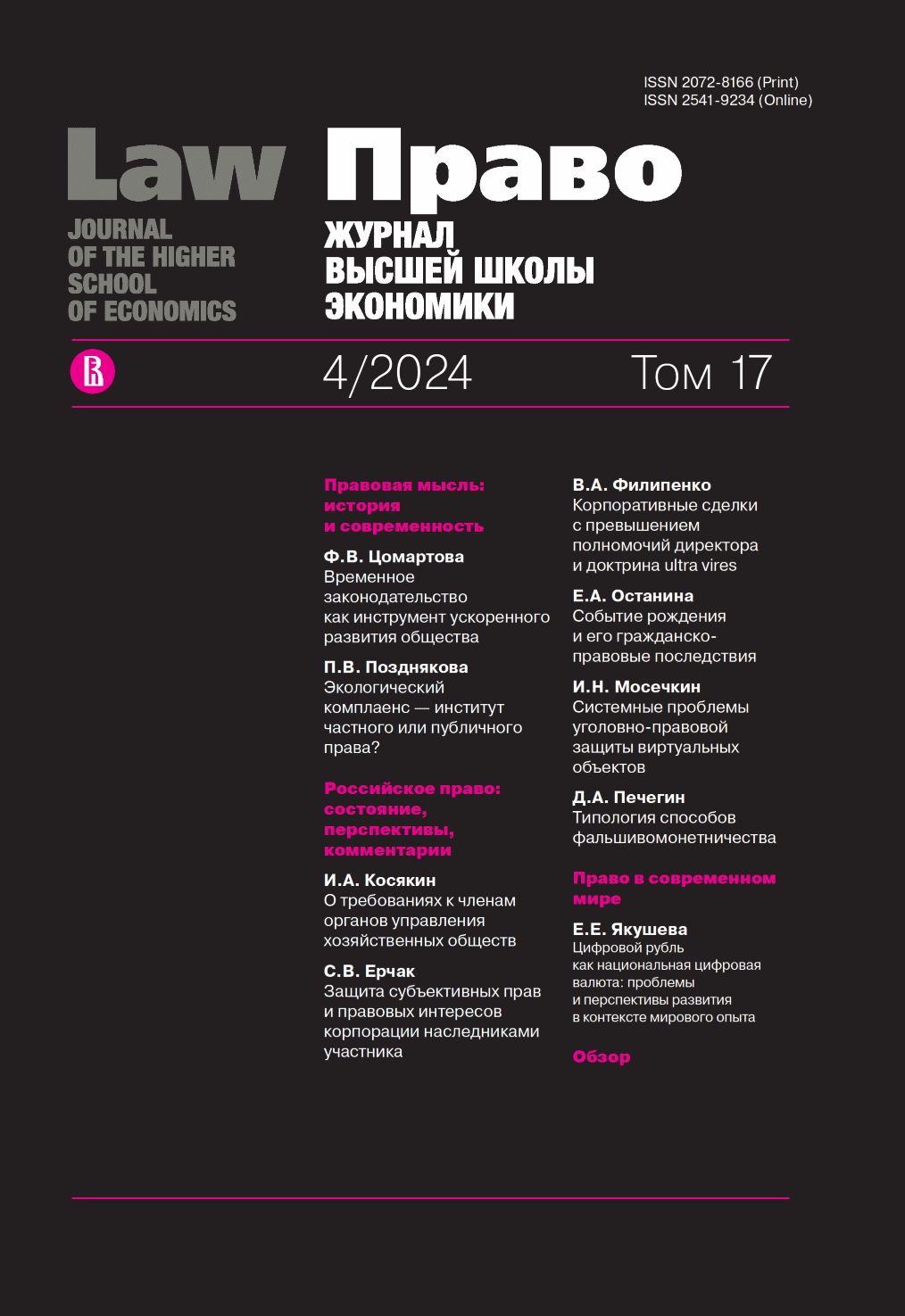Financial Stimulation of Apprenticeship in Russia: Comparative Legal Research
Abstract
The article raises the problem of development of apprenticeship in Russia. This institute is equally beneficial for employers, apprentices and the state. It has been found out that the main obstacle to its development is in financial costs that employers bear when they organize internship for students and professional training of employees in educational organizations. The authors study the ways to minimize the aforementioned costs on the example of the foreign countries' experience where apprenticeship has existed for a long time and positively influenced the economy of companies and the states themselves. Correspondingly, the subject of the article is social relations arise in the light of state financial support of apprenticeship. The methodology of the research is represented by normative micro-comparison, in particular external comparison, since apprenticeship as a legal institute is common for different legal systems and for various branches of law: labor law and financial law. The authors implement functional comparison as well to find an effective model of legal regulation. The effectiveness is measured through the social and economic results achieved by the states. The comparative historical method, in particular diachronic analysis of legal regulation, has helped the authors to see the transfer among various models of financial support of apprenticeship in different states retrospectively. In the course of the research the authors identify mechanisms of direct and indirect financing of apprenticeship, the existence of peculiar taxes, tax benefits, funds, special apprenticeship programs. Following the goals defined by the President of Russia after XXVI International Economic Forum in Saint Petersburg the authors analyze the current state of the Russian legislation concerning apprenticeship issues and make a conclusion about the directions for its improvement on the basis of the foreign experience. The authors propose to expand the list of tax benefits by introducing a tax credit that would support employers, in particular small and medium-sized enterprises, which involve in apprenticeship programs.
References
Aggarwal A., Aggarwal G. (2021) New Directions for Apprenticeships. Singapore: Springer, 321 p. DOI: https://doi.org/10.1007/978-981-16-0983-1_15
Alber M. (2019) Körperschaftsteuer in der Unternehmenspraxis. Wiesbaden: Springer Gabler, 540 S. DOI: https://doi.org/10.1007/978-3-658-19961-6
Dolmatova N.G. (2021) Legal Foundations of Types of Budgetary Security. Finansovoe pravo=Financial Law, no. 10, pp. 17–19 (in Russ.)
Kang K.-J. et al. (2017) Apprenticeships in Korea. Sejong: KRIVET, 105 p.
Kopina A.A. (2023) Legal Means of Implementing Tax Functions at the Present Stage. Nalogi=Taxes, no. 3, pp. 9–14 (in Russ.)
Kuczera M., Field S. (2018) Apprenticeship in England, United Kingdom, OECD Reviews of Vocational Education and Training. Paris: OECD Publishing, 120 p. DOI: https://doi.org/10.1787/9789264298507-en
Kudryavtsev V.N. et al. (1980) Efficiency of Legal Norms. Moscow: Yuridicheskaya literatura, 280 p. (in Russ.)
Malinovsky A.A. (2016) Methodology of Comparative Law. Vestnik Universiteta O.E. Kutafina=Bulletin of the Kutafin University, no. 3, pp. 9–24 (in Russ.)
Michurina Yu. P. (2022) Classification of Tax Expenses and Their Types. Finansovoe pravo=Financial Law, no. 10, pp. 30–31 (in Russ.) DOI: https://doi.org/10.18572/1813-1220-2022-10-30-31
Muehlemann S. et al. (2010) Financing apprenticeship training in the light of labor market regulations. Labour Economics, vol. 17, no. 5, pp. 799–809. DOI: https://doi.org/10.1016/j.labeco.2010.04.006
Savina M.V. et al. (2022) Conceptual Aspects of Innovative Policy in the Educational Field. Moscow: Dashkov Press, 132 p. (in Russ.)
Smith E. (2022) Apprenticeships: The problem of attractiveness and the hindrance of heterogeneity. International Journal of Training and Development, vol. 27, no. 1, pp. 1–21. DOI: https://doi.org/10.1111/ijtd.12281
Smith E., Rauner F. (2010) Rediscovering Apprenticeship. Dordrecht: Springer, 175 p. DOI: https://doi.org/10.1007/978-90-481-3116-7
Van Hoecke M. (2015) Methodology of Comparative Legal Research. Law and Method, vol. 5, no. 4, pp. 1–35. DOI: https://doi.org/10.5553/REM/.000010
Zandanov I.V. (2009) Apprenticeship Contract and Professional Development Contract: General and Special. Zhurnal rossiyskogo prava=Journal of Russian Law, no. 12, pp. 85–94 (in Russ.)
Copyright (c) 2024 Ageev S., Osina D.

This work is licensed under a Creative Commons Attribution-ShareAlike 4.0 International License.


















